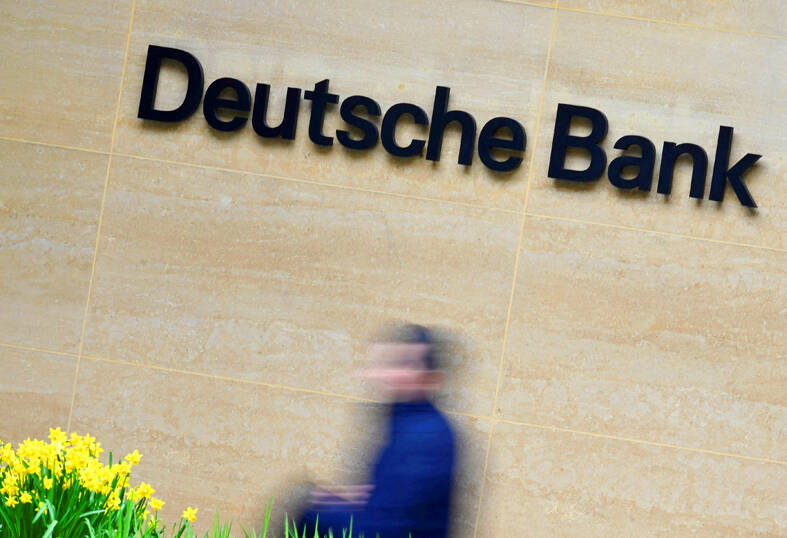The start of the year is normally a time when Europe’s bankers wait nervously for a word on their bonuses, but weeks into this year, some are starting to wonder if they will even have a job.
On Thursday, Deutsche Bank AG chief executive officer Christian Sewing put his staff on notice, saying he is looking to cut headcount including managers. HSBC Holdings PLC CEO Georges Elhedery earlier this week said it is shuttering large parts of its investment bank in Europe and the US.
Even Swiss private banking is not immune to the turmoil: UBS Group AG is shedding hundreds of jobs in its home market, while Julius Baer Group Ltd is set to announce a wave of redundancies over the next two years.

Photo: Reuters
Sewing told reporters that this year will be “the year of reckoning,” adding that “nothing is off limits.”
Behind all these disparate moves is a push to improve lagging profits, a concern that is only likely to get more acute as the US President Trump administration’s pro-business approach to deregulation in the US puts Europe’s lenders potentially at a disadvantage over their Wall Street rivals. In addition, stagnant growth in the EU is further threatening to weigh on the outlook for the region’s lenders.
The contrast between Europe’s and US banks is already quite stark. At JPMorgan Chase & Co, which this month announced the largest profit in its history, chief financial officer Jeremy Barnum said one of the biggest issues he faced was the “high-class” dilemma of what to do with all the excess capital the bank was generating.
The message from Goldman Sachs Group Inc CEO David Solomon was all about confidence as he talked about positioning the firm for a resurgence in dealmaking.
“It’s a reflection of how European banks have struggled to compete with their US peers” since the 2008 global financial crisis, said John Cronin, a Dublin-based financial industry analyst and founder of SeaPoint Insights. “If anything, given the new pro-growth Trump administration, the top five US banks will become relatively stronger over the coming years.”
To be sure, it is not all doom and gloom for Europe’s lenders. Some of them are planning to raise payouts this year. Deutsche Bank is looking at a 10 percent increase in bonuses for its investment bankers, while BNP Paribas SA is eyeing 5 percent. Barclays PLC is set to raise the number by as much as 20 percent after an improved year for traders and advisory teams.
The changes at HSBC, the most dramatic yet, are likely to unfold through June. Since taking charge five months ago, CEO Elhedery has been a man on a mission to give the British lender a complete makeover, with his latest move set to abandon all dreams of rivaling Wall Street peers.
“Going forward we will focus on areas where we can best serve our corporate and institutional clients,” said Elhedery’s lieutenant Michael Roberts, who heads the corporate and institutional banking division.
Still, the bank will have a strong footprint in Asia, especially China and Hong Kong, and the Middle East.

In Italy’s storied gold-making hubs, jewelers are reworking their designs to trim gold content as they race to blunt the effect of record prices and appeal to shoppers watching their budgets. Gold prices hit a record high on Thursday, surging near US$5,600 an ounce, more than double a year ago as geopolitical concerns and jitters over trade pushed investors toward the safe-haven asset. The rally is putting undue pressure on small artisans as they face mounting demands from customers, including international brands, to produce cheaper items, from signature pieces to wedding rings, according to interviews with four independent jewelers in Italy’s main

Japanese Prime Minister Sanae Takaichi has talked up the benefits of a weaker yen in a campaign speech, adopting a tone at odds with her finance ministry, which has refused to rule out any options to counter excessive foreign exchange volatility. Takaichi later softened her stance, saying she did not have a preference for the yen’s direction. “People say the weak yen is bad right now, but for export industries, it’s a major opportunity,” Takaichi said on Saturday at a rally for Liberal Democratic Party candidate Daishiro Yamagiwa in Kanagawa Prefecture ahead of a snap election on Sunday. “Whether it’s selling food or

CONCERNS: Tech companies investing in AI businesses that purchase their products have raised questions among investors that they are artificially propping up demand Nvidia Corp chief executive officer Jensen Huang (黃仁勳) on Saturday said that the company would be participating in OpenAI’s latest funding round, describing it as potentially “the largest investment we’ve ever made.” “We will invest a great deal of money,” Huang told reporters while visiting Taipei. “I believe in OpenAI. The work that they do is incredible. They’re one of the most consequential companies of our time.” Huang did not say exactly how much Nvidia might contribute, but described the investment as “huge.” “Let Sam announce how much he’s going to raise — it’s for him to decide,” Huang said, referring to OpenAI

The global server market is expected to grow 12.8 percent annually this year, with artificial intelligence (AI) servers projected to account for 16.5 percent, driven by continued investment in AI infrastructure by major cloud service providers (CSPs), market researcher TrendForce Corp (集邦科技) said yesterday. Global AI server shipments this year are expected to increase 28 percent year-on-year to more than 2.7 million units, driven by sustained demand from CSPs and government sovereign cloud projects, TrendForce analyst Frank Kung (龔明德) told the Taipei Times. Demand for GPU-based AI servers, including Nvidia Corp’s GB and Vera Rubin rack systems, is expected to remain high,